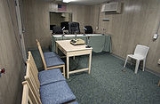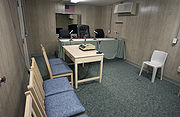
Mohammed Yacoub
Encyclopedia
Mohammed Yacoub is a citizen of Afghanistan
, held in extrajudicial detention
in the United States
Guantanamo Bay detention camps, in Cuba
.
The Department of Defense
assigned him the Internment Serial Number 1004 and Intelligence analysts estimate that Yacoub was born in 1976.
 Initially the Bush administration asserted that they could withhold all the protections of the Geneva Conventions
Initially the Bush administration asserted that they could withhold all the protections of the Geneva Conventions
to captives from the war on terror. This policy was challenged before the Judicial branch. Critics argued that the USA could not evade its obligation to conduct a competent tribunal
s to determine whether captives are, or are not, entitled to the protections of prisoner of war
status.
Subsequently the Department of Defense
instituted the Combatant Status Review Tribunal
s. The Tribunals, however, were not authorized to determine whether the captives were lawful combatants -- rather they were merely empowered to make a recommendation as to whether the captive had previously been correctly determined to match the Bush administration's definition of an enemy combatant
.
Yacoub chose to participate in his Combatant Status Review Tribunal
.
The Associated Press
reports Yacoub lost his left leg in a mortar attack in Kabul
.
He denied fighting against the USA, or helping foreign fighters.
He acknowledged serving with the Taliban.
was prepared for
Mohammed Yacoub's
Combatant Status Review Tribunal,
on
2 November 2004.
The memo listed the following allegations against him:
 Detainees who were determined to have been properly classified as "enemy combatants" were scheduled to have their dossier reviewed at annual Administrative Review Board
Detainees who were determined to have been properly classified as "enemy combatants" were scheduled to have their dossier reviewed at annual Administrative Review Board
hearings. The Administrative Review Boards weren't authorized to review whether a detainee qualified for POW status, and they weren't authorized to review whether a detainee should have been classified as an "enemy combatant".
They were authorized to consider whether a detainee should continue to be detained by the United States, because they continued to pose a threat—or whether they could safely be repatriated to the custody of their home country, or whether they could be set free.
was prepared for
Mohammed Yacoub's first annual
Administrative Review Board,
on April 19, 2005.
The memo listed factors for and against his continued detention.
The following primary factors favor continued detention
The following primary factors favor release or transfer
The Board's recommendation was unanimous
The Board's recommendation was redacted.
England authorized his transfer on 8 August 2005.
published medical records for the captives.
According to those records Mohammed Yacoub
was 66 inches tall.
According to those records his weight was recorded 38
times.
According to that list he was repatriated on August 7, 2007, along with four other Afghans.
The Center for Constitutional Rights
reports that all of the Afghans repatriated to Afghanistan from April 2007 were sent to Afghan custody in the American built and supervised wing of the Pul-e-Charkhi prison
near Kabul
.
Afghanistan
Afghanistan , officially the Islamic Republic of Afghanistan, is a landlocked country located in the centre of Asia, forming South Asia, Central Asia and the Middle East. With a population of about 29 million, it has an area of , making it the 42nd most populous and 41st largest nation in the world...
, held in extrajudicial detention
Extrajudicial detention
Arbitrary or extrajudicial detention is the detention of individuals by a state, without ever laying formal charges against them.Although it has a long history of legitimate use in wartime , detention without charge, sometimes in secret, has been one of the hallmarks of totalitarian states...
in the United States
United States
The United States of America is a federal constitutional republic comprising fifty states and a federal district...
Guantanamo Bay detention camps, in Cuba
Cuba
The Republic of Cuba is an island nation in the Caribbean. The nation of Cuba consists of the main island of Cuba, the Isla de la Juventud, and several archipelagos. Havana is the largest city in Cuba and the country's capital. Santiago de Cuba is the second largest city...
.
The Department of Defense
United States Department of Defense
The United States Department of Defense is the U.S...
assigned him the Internment Serial Number 1004 and Intelligence analysts estimate that Yacoub was born in 1976.
Combatant Status Review Tribunal

Geneva Conventions
The Geneva Conventions comprise four treaties, and three additional protocols, that establish the standards of international law for the humanitarian treatment of the victims of war...
to captives from the war on terror. This policy was challenged before the Judicial branch. Critics argued that the USA could not evade its obligation to conduct a competent tribunal
Competent tribunal
Competent Tribunal is a term used Article 5 paragraph 2 of the Third Geneva Convention, which states:-ICRC commentary on competent tribunals:...
s to determine whether captives are, or are not, entitled to the protections of prisoner of war
Prisoner of war
A prisoner of war or enemy prisoner of war is a person, whether civilian or combatant, who is held in custody by an enemy power during or immediately after an armed conflict...
status.
Subsequently the Department of Defense
United States Department of Defense
The United States Department of Defense is the U.S...
instituted the Combatant Status Review Tribunal
Combatant Status Review Tribunal
The Combatant Status Review Tribunals were a set of tribunals for confirming whether detainees held by the United States at the Guantanamo Bay detention camp had been correctly designated as "enemy combatants". The CSRTs were established July 7, 2004 by order of U.S. Deputy Secretary of Defense...
s. The Tribunals, however, were not authorized to determine whether the captives were lawful combatants -- rather they were merely empowered to make a recommendation as to whether the captive had previously been correctly determined to match the Bush administration's definition of an enemy combatant
Enemy combatant
Enemy combatant is a term historically referring to members of the armed forces of the state with which another state is at war. Prior to 2008, the definition was: "Any person in an armed conflict who could be properly detained under the laws and customs of war." In the case of a civil war or an...
.
Yacoub chose to participate in his Combatant Status Review Tribunal
Combatant Status Review Tribunal
The Combatant Status Review Tribunals were a set of tribunals for confirming whether detainees held by the United States at the Guantanamo Bay detention camp had been correctly designated as "enemy combatants". The CSRTs were established July 7, 2004 by order of U.S. Deputy Secretary of Defense...
.
The Associated Press
Associated Press
The Associated Press is an American news agency. The AP is a cooperative owned by its contributing newspapers, radio and television stations in the United States, which both contribute stories to the AP and use material written by its staff journalists...
reports Yacoub lost his left leg in a mortar attack in Kabul
Kabul
Kabul , spelt Caubul in some classic literatures, is the capital and largest city of Afghanistan. It is also the capital of the Kabul Province, located in the eastern section of Afghanistan...
.
He denied fighting against the USA, or helping foreign fighters.
He acknowledged serving with the Taliban.
Summary of Evidence memo
A Summary of Evidence memoSummary of Evidence (CSRT)
Counter-terrorism analysts prepared a Summary of Evidence memo for the Combatant Status Review Tribunals of the 558 captives who remained in the Guantanamo Bay detention camps, in Cuba in the fall of 2004.-The 2005 release:...
was prepared for
Mohammed Yacoub's
Combatant Status Review Tribunal,
on
2 November 2004.
The memo listed the following allegations against him:
Administrative Review Board hearing

Administrative Review Board
The Administrative Review Board is a United States military body that conducts an annual review of the suspects held by the United States in Camp Delta in the United States Navy base at Guantanamo Bay, Cuba....
hearings. The Administrative Review Boards weren't authorized to review whether a detainee qualified for POW status, and they weren't authorized to review whether a detainee should have been classified as an "enemy combatant".
They were authorized to consider whether a detainee should continue to be detained by the United States, because they continued to pose a threat—or whether they could safely be repatriated to the custody of their home country, or whether they could be set free.
Summary of Evidence memo
A Summary of Evidence memoSummary of Evidence (ARB)
Counter-terrorism analysts prepared a Summary of Evidence memo for the Administrative Review Board hearings of approximately 460 captives in the Guantanamo Bay detention camps, in Cuba from December 2004 to December 2005.-Release of the memos:...
was prepared for
Mohammed Yacoub's first annual
Administrative Review Board,
on April 19, 2005.
The memo listed factors for and against his continued detention.
The following primary factors favor continued detention
The following primary factors favor release or transfer
Board recommendations
In early September 2007 the Department of Defense released two heavily redacted memos, from his Board, to Gordon England, the Designated Civilian Official.The Board's recommendation was unanimous
The Board's recommendation was redacted.
England authorized his transfer on 8 August 2005.
Guantanamo Medical records
On 16 March 2007 the Department of DefenseUnited States Department of Defense
The United States Department of Defense is the U.S...
published medical records for the captives.
According to those records Mohammed Yacoub
was 66 inches tall.
According to those records his weight was recorded 38
times.
Repatriation
On November 25, 2008 the Department of Defense published a list of when Guantanamo captives were repatriated.According to that list he was repatriated on August 7, 2007, along with four other Afghans.
The Center for Constitutional Rights
Center for Constitutional Rights
Al Odah v. United States:Al Odah is the latest in a series of habeas corpus petitions on behalf of people imprisoned at the Guantanamo Bay detention center. The case challenges the Military Commissions system’s suitability as a habeas corpus substitute and the legality, in general, of detention at...
reports that all of the Afghans repatriated to Afghanistan from April 2007 were sent to Afghan custody in the American built and supervised wing of the Pul-e-Charkhi prison
Pul-e-Charkhi prison
Pul-e-Charkhi , also known as Afghan National Detention Facility, is the largest prison in Afghanistan east of Kabul. Construction of the jail began in the 1970s by order of former president Mohammed Daoud Khan and was completed during the 1980s...
near Kabul
Kabul
Kabul , spelt Caubul in some classic literatures, is the capital and largest city of Afghanistan. It is also the capital of the Kabul Province, located in the eastern section of Afghanistan...
.

